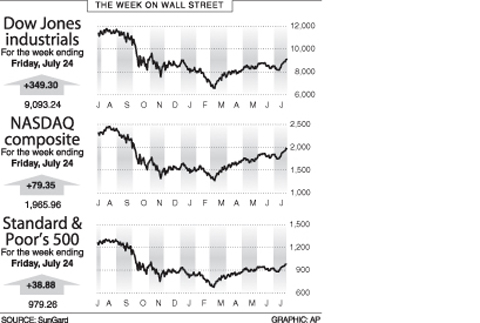Wall Street may take a breather in the upcoming week after an earnings-driven rally lifted the major US stock indexes to their highest levels in months.
The blue-chip Dow Jones industrial average popped back above the 9,000 mark this week for the first time since January. And the Standard and Poor’s 500 Index ended Friday at 979.26 — up almost 45 percent from the 12-year closing low hit on March 9 — after a number of prominent companies’ earnings surpassed Wall Street’s expectations.
This week’s “market enjoyed the better-than-expected earnings, or I should say, less-bad-than-expected earnings, but we can play the game for only so long,” said Scott Marcouiller, senior equity market strategist at Wells Fargo Advisors in St Louis. “Stay cautious. We can’t put a cap on it [the rally] yet, but there will be a correction.”

The exuberance was interrupted on Friday as disappointing quarterly revenues from Microsoft Corp and Amazon.com hit their stocks and weighed on the NASDAQ, which fell on Friday and halted a 12-day run of gains.
In contrast, both the blue-chip Dow average and the S&P 500 ended Friday’s session at eight-month closing highs.
The earnings blitz will continue next week, with about a third of the S&P 500 companies expected to report results, including such high-profile names as Exxon Mobil Corp and Walt Disney Co. Both are also Dow components.

Wall Street and Main Street are likely to tune in when US Federal Reserve Chairman Ben Bernanke appears on PBS next week in a town hall-style forum called “Bernanke on the Record,” hosted by Jim Lehrer.
After being grilled repeatedly on Capitol Hill about the troubles continuing to roil the nation’s economy, Bernanke will talk about the Fed’s response to last year’s economic crisis and its role in economic recovery. The program, which will be recorded today at the Federal Reserve Bank of Kansas City, will be broadcast on The NewsHour with Jim Lehrer on PBS tomorrow, on Tuesday and Wednesday; a one-hour special will be aired on or after Wednesday, PBS said.
Investors will get the first look at second-quarter GDP growth on Friday. New home sales, consumer confidence and durable goods orders are among the major indicators on tap.
The week will start with new home sales for last month, due today. Economists polled by Reuters predict an annual pace of 350,000 units, up from May’s 342,000.
The Conference Board, a private research group, will release its consumer confidence index for this month on Tuesday. The forecast: 49.0 vs June’s 49.3, the Reuters poll showed.
The Conference Board’s consumer confidence index is expected to reflect concerns over job insecurity and falling home values. The Reuters/University of Michigan Surveys of Consumers showed on Friday that US consumer sentiment ebbed late this month to the lowest reading since April on growing pessimism about the long-term economic outlook. Its final consumer sentiment reading fell for this month to 66.0 from last month’s 70.8.
Durable goods orders, due on Wednesday, are forecast to have declined last month. But that may be skewed by bankruptcy filings affecting auto production. Initial jobless benefits claims, due on Thursday, are seen rising in the latest week.
The GDP data due on Friday could reinforce the perception that the worst US recession in decades will end in the year’s second half.

WAITING GAME: The US has so far only offered a ‘best rate tariff,’ which officials assume is about 15 percent, the same as Japan, a person familiar with the matter said Taiwan and the US have completed “technical consultations” regarding tariffs and a finalized rate is expected to be released soon, Executive Yuan spokeswoman Michelle Lee (李慧芝) told a news conference yesterday, as a 90-day pause on US President Donald Trump’s “reciprocal” tariffs is set to expire today. The two countries have reached a “certain degree of consensus” on issues such as tariffs, nontariff trade barriers, trade facilitation, supply chain resilience and economic security, Lee said. They also discussed opportunities for cooperation, investment and procurement, she said. A joint statement is still being negotiated and would be released once the US government has made

‘CRUDE’: The potential countermeasure is in response to South Africa renaming Taiwan’s representative offices and the insistence that it move out of Pretoria Taiwan is considering banning exports of semiconductors to South Africa after the latter unilaterally downgraded and changed the names of Taiwan’s two representative offices, the Ministry of Foreign Affairs (MOFA) said yesterday. On Monday last week, the South African Department of International Relations and Cooperation unilaterally released a statement saying that, as of April 1, the Taipei Liaison Offices in Pretoria and Cape Town had been renamed the “Taipei Commercial Office in Johannesburg” and the “Taipei Commercial Office in Cape Town.” Citing UN General Assembly Resolution 2758, it said that South Africa “recognizes the People’s Republic of China (PRC) as the sole

NEW GEAR: On top of the new Tien Kung IV air defense missiles, the military is expected to place orders for a new combat vehicle next year for delivery in 2028 Mass production of Tien Kung IV (Sky Bow IV) missiles is expected to start next year, with plans to order 122 pods, the Ministry of National Defense’s (MND) latest list of regulated military material showed. The document said that the armed forces would obtain 46 pods of the air defense missiles next year and 76 pods the year after that. The Tien Kung IV is designed to intercept cruise missiles and ballistic missiles to an altitude of 70km, compared with the 60km maximum altitude achieved by the Missile Segment Enhancement variant of PAC-3 systems. A defense source said yesterday that the number of

Taiwanese exports to the US are to be subject to a 20 percent tariff starting on Thursday next week, according to an executive order signed by US President Donald Trump yesterday. The 20 percent levy was the same as the tariffs imposed on Vietnam, Sri Lanka and Bangladesh by Trump. It was higher than the tariffs imposed on Japan, South Korea and the EU (15 percent), as well as those on the Philippines (19 percent). A Taiwan official with knowledge of the matter said it is a "phased" tariff rate, and negotiations would continue. "Once negotiations conclude, Taiwan will obtain a better